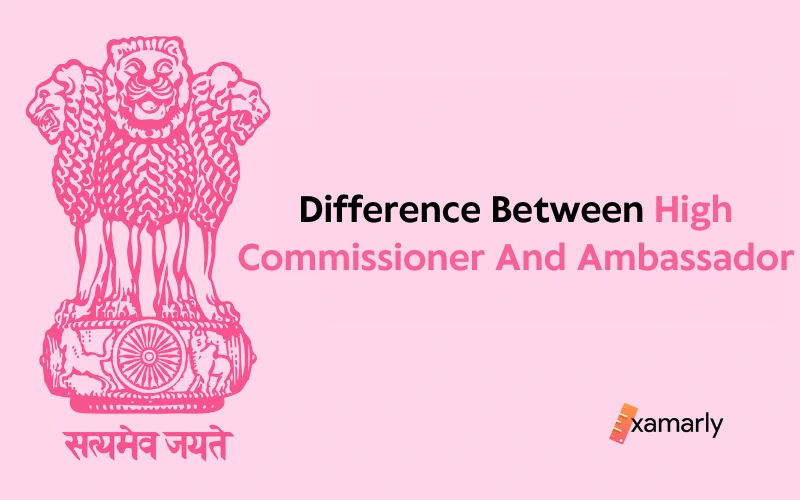An Overview
High Commissioners and Ambassadors are some of the most important figures in the world of diplomacy. They are officers of the Indian Foreign Services (IFS) who serve as the official representatives of their countries. They play a crucial role in maintaining relations and promoting cooperation between nations.
In this blog, we will explore the difference between High Commissioner and Ambassador and their roles and responsibilities. We will also take a look at the impact they have on international relations.
Whether you are a Civil Services aspirant, a student of International Relations, a career diplomat, or just someone who is interested in learning more about the world of diplomacy, this blog will provide you with a comprehensive understanding of the role of High Commissioners and Ambassadors.
- An Overview
- Who Is A High Commissioner?
- Who Is An Ambassador?
- Difference Between High Commissioner And Ambassador
- Summing Up
- FAQs about Ambassadors and High Commissioner
- What Is The Difference Between A High Commissioner And An Ambassador?
- What Are The Duties Of A High Commissioner?
- Does The Ambassador Have Any Consular Duties?
- Where Are High Commissioner And Ambassador Based?
- Can High Commissioner Represent Their Country In International Organisations?
- Can Ambassadors Represent Their Country In International Organisations?
- How are High Commissioner and Ambassador appointed?
- What are the qualifications required to become a High Commissioner or an Ambassador?
- Are High Commissioner and Ambassador only appointed by government officials?
Who Is A High Commissioner?
A High Commissioner is a diplomatic representative who serves as the head of a diplomatic mission, typically in a Commonwealth country. They are responsible for representing their country’s interests and promoting bilateral relations with the host country.
In other words, a High Commissioner is a senior-level diplomatic representative of a country who is appointed to serve as the head of a diplomatic mission in Commonwealth nations. The position is typically held by a senior government official or a career diplomat and is considered to be one of the highest ranks in the diplomatic service.
High commissioners are appointed by their home government and are responsible for representing the interests of their country in the host country, negotiating agreements and treaties, and maintaining diplomatic relations between the two countries.
During the time of the British Empire, the British government would appoint High Commissioners to oversee countries that were not entirely under British authority. These commissioners would be responsible for ensuring that British interests were protected. These territories were managed by High Commissioners, while territories that were fully under British sovereignty were governed by governors.
The Commonwealth of Nations is a group of 53 member states. These were mostly former territories of the British Empire. The organisation has two main institutions, the Commonwealth Secretariat, which deals with intergovernmental matters, and the Commonwealth Foundation, which focuses on the non-governmental relations between member states.
Responsibilities And Duties Of A High Commissioner
The responsibilities and duties of a High Commissioner include:
- Representing their country’s interests and promoting bilateral relations with the host country
- Negotiating and signing treaties and agreements on behalf of their country
- Providing assistance and protection to their country’s citizens in the host country
- Promoting trade and investment between their country and the host country
- Maintaining and developing cultural and educational ties between their country and the host country
Qualification Of A High Commissioner
The qualifications required to be a High Commissioner vary depending on the country and the specific position, but generally, candidates should have:
- A degree in a relevant field, such as international relations or diplomacy
- Several years of experience in the foreign service or related field
- Strong communication and negotiation skills
- A good understanding of the host country and its culture
- Strong leadership and management skills
Who Is An Ambassador?
An Ambassador is a diplomatic representative of a country who is appointed to serve as the head of a diplomatic mission in another country. The position is typically held by a senior government official or a career diplomat and is considered to be one of the highest ranks in the diplomatic service.
Ambassadors are responsible for representing their country’s interests in the host country, negotiating agreements and treaties, and maintaining diplomatic relations between the two countries. They also serve as a liaison between the government of their home country and the government of the host country and may be involved in promoting trade and cultural exchange.
An ambassador is the official representative of a country to another country and is typically based in the capital city of the host country. The ambassador is appointed by the head of state or government of their home country and is usually responsible for representing the interests of their country in the host country. The ambassador is usually responsible for maintaining diplomatic relations between the two countries, negotiating agreements and treaties, and promoting trade, cultural exchange and other forms of cooperation between the two countries.
Responsibilities And Duties Of An Ambassador
The role of an Ambassador is multifaceted and includes a wide range of responsibilities and duties such as:
- Representing their country in the host country and promoting bilateral relations
- Negotiating and signing treaties and agreements on behalf of their country
- Advising their government on political, economic, and social developments in the host country
- Providing assistance and protection to their country’s citizens in the host country
- Promoting trade and investment between their country and the host country
- Maintaining and developing cultural and educational ties between their country and the host country
- Representing their country in international organisations and conferences
Qualifications Of An Ambassador
The qualifications required to be an Ambassador vary depending on the country and the specific position, but generally, candidates should have:
- A degree in a relevant field, such as international relations or diplomacy
- Several years of experience in the foreign service or related field
- Strong communication and negotiation skills
- A good understanding of the host country and its culture
- Strong leadership and management skills
- Fluency in one or more foreign languages
Difference Between High Commissioner And Ambassador
The role of a High Commissioner is similar to that of an Ambassador, but there are some key differences. Ambassadors are typically appointed to represent their country in a foreign capital, while High Commissioners are appointed to represent their country in countries that are members of the Commonwealth. Additionally, Ambassadors are typically appointed by the head of state or government, while High Commissioners are appointed by the foreign ministry.
We will understand the difference between High Commissioner and Ambassador through the table given below.
| High Commissioner | Ambassador |
|---|---|
| A term used for representatives to the Commonwealth of Nations | A term used for representatives in non-Commonwealth countries |
| Office of the Indian Foreign Ministry in Commonwealth nations | Office of the Indian Foreign Ministry in non-Commonwealth nations |
| Appointed in countries which used to be British colonies | Appointed in countries which were not part of British rule |
| Envoys of the Imperial government to manage colonies and tributaries not fully under the sovereignty of the empire | The role developed as diplomats in 17th-century Italian states |
| Carries a simple informal letter of introduction from one head of government | Carries formal letters of credence from their head of state |
| Put in charge of activities such as decolonisation | Foster good diplomatic relations and work for peace by stopping illegal activities |
| More involved in local society | Less involved in local society |
| Keeps the interest of the locals and their own citizens in front | Keeps its own people’s interest ahead |
Being a High Commissioner or an Ambassador is a highly respected and challenging role that requires a great deal of dedication and hard work. It involves representing one’s country in a foreign land and promoting its interests while maintaining good relations with the host country. It requires a deep understanding of diplomacy, politics, and international relations, as well as the ability to navigate complex cultural and economic issues.
Check Out Our Latest Blogs:
| Right To Freedom | Right Against Exploitation |
| Difference Between Capitalism And Communism | Difference Between Capitalism And Socialism |
Summing Up
In summary, we can list the following points as the key learnings from this article on High Commission and Ambassadors.
- A High Commissioner is a senior-level diplomatic representative or a senior diplomat appointed as the head of a diplomatic mission in Commonwealth countries.
- High Commissioners are responsible for representing their country’s interests, negotiating agreements and treaties, and maintaining diplomatic relations between the two countries.
- They also promote trade, cultural exchange, and other forms of cooperation.
- High commissioners are typically based in the capital city of the host country and may also have jurisdiction over other countries in the region.
- An Ambassador is a diplomatic representative appointed as the head of a diplomatic mission in most countries, they have similar responsibilities as a High commissioner but the term is widely used in most countries.
- An Ambassador is appointed by the head of state or government of their home country and is typically based in the capital city of the host country.
- They have consular duties such as issuing visas, protecting the rights and interests of their home country’s citizens in the host country and providing assistance to citizens of their home country who are in distress.
- It is worth noting that the term “Ambassador” is widely used in most countries and the head of the diplomatic mission is usually referred to as an Ambassador.
- However, in certain countries that are part of the Commonwealth of Nations, the head of the diplomatic mission is referred to as High Commissioner.
In conclusion, Ambassadors are a key component of international diplomacy, representing their country’s interests and promoting bilateral relations with host countries, especially with host countries that are members of the Commonwealth in the case of the High Commissioner. They have a wide range of responsibilities and qualifications, and the role requires a great deal of dedication and hard work. They are appointed by the head of state or government, and it’s a position of great responsibility, that requires a person to have a strong understanding of diplomacy, politics and international relations.
FAQs about Ambassadors and High Commissioner
What Is The Difference Between A High Commissioner And An Ambassador?
A High commissioner is appointed as the head of a diplomatic mission in Commonwealth countries, while an Ambassador is appointed as the head of a diplomatic mission in most countries.
What Are The Duties Of A High Commissioner?
The duties of a High commissioner include representing their country’s interests in the host country, negotiating agreements and treaties, and maintaining diplomatic relations between the two countries.
Does The Ambassador Have Any Consular Duties?
Yes, the Ambassador may have consular duties such as issuing visas, protecting the rights and interests of their home country’s citizens in the host country and providing assistance to citizens of their home country who are in distress.
Where Are High Commissioner And Ambassador Based?
The High commissioner is typically based in the capital city of the host country, and may also have jurisdiction over other countries in the region. An Ambassador is typically based in the capital city of the host country.
Can High Commissioner Represent Their Country In International Organisations?
Yes, High Commissioner can represent their country in international organisations and other international forums.
Can Ambassadors Represent Their Country In International Organisations?
Yes, an Ambassador can represent their country in international organisations and other international forums.
How are High Commissioner and Ambassador appointed?
A High commissioner is appointed by the head of State or government of their home country while even an Ambassador is appointed by the head of State or government of their home country.
What are the qualifications required to become a High Commissioner or an Ambassador?
The qualifications required to become a High commissioner or an Ambassador usually include serving in the Indian Foreign Services (IFS). One could start by earning a degree in a relevant field such as international relations or political science, as well as several years of experience in the diplomatic service or government.
Are High Commissioner and Ambassador only appointed by government officials?
Generally, High Commissioner and an Ambassador are appointed by government officials, but in some cases, they can also be appointed by private citizens or organisations, typically when they are appointed as special envoys or representatives.






